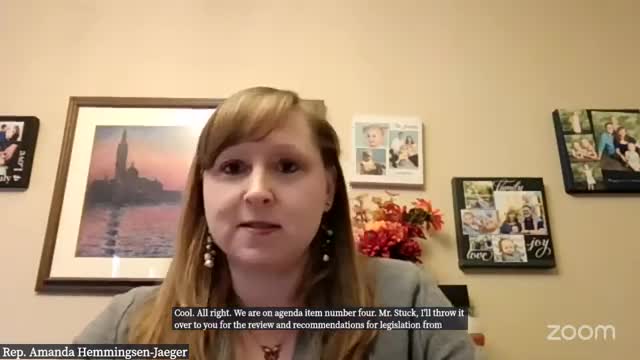Subcommittee reviews broad stakeholder legislative wish list covering lakes, forests, flood projects and private wells
Get AI-powered insights, summaries, and transcripts
Subscribe
Summary
Committee staff summarized multiple stakeholder requests for possible bills, including lake protection funding, salt applicator certification, Red River storage funding, private well testing clinics and a proposed Minnesota River commission.
St. Paul — Committee staff presented a summary Dec. 3 of stakeholder requests for legislation the Subcommittee on Minnesota Water Policy could consider before the next session, covering a range of water-related proposals intended to be largely bipartisan.
Staff member Mr. Steck told members the list is a “thumbnail sketch” of requests stakeholders have raised over the past six months and proposed moving ahead by drafting bill language for committee review prior to session. The proposals include a mix of funding requests, targeted program changes and new institutional structures.
“Most of these issues are bipartisan in nature,” Steck said, and many items have been introduced in prior sessions, he said. He recommended the chairs and staff work with potential authors and bring draft language to the committee for review.
The items summarized for the committee included:
- Winter lake waste and trash prevention: a DNR-coordinated outreach and local grant program to provide services and guidance to reduce human waste and trash left on ice-covered lakes during winter recreation.
- Salt applicator certification: voluntary training and limited liability for salt applicators who complete certification, intended to reduce salt use and protect lakes.
- Water-allocation technical change: add schools and hospitals to the highest-priority water allocation category to address a legal issue identified in a White Bear Lake judge’s decision.
- Upper Mississippi priority lakes and stream protection: a 10-year initiative, supported by a proposed $8 million per year fund (and an initial $5 million appropriation request for planning), to protect and expand private forested protection in priority watersheds and support watershed plans.
- Private riparian buffer tax credit: a credit for landowners who take riparian lands out of agricultural production to create buffers.
- Red River water-storage funding: a multi-state cost-share summary estimating $3.5 billion in structural investments over 10 years, with Minnesota needs of about $271 million in state and local funding over the decade and a proposed 2-mill levy to support the Red River Water Management Board.
- Enhanced groundwater recharge: policy and funding steps to capitalize on a statewide study of groundwater recharge feasibility and encourage recharge where appropriate.
- Voluntary private well testing clinics: an allocation to Minnesota Department of Health and University of Minnesota to support nonprofit-run private well safety testing clinics.
- Aquatic invasive species funding: additional investments to support local governments and lake associations in managing invasive species.
- Wake-surfing guidance and education: nonregulatory guidance including suggested setbacks (for example, 500 feet from shore and operating in water >20 feet) to reduce shoreline and ecological impacts, focused on education and local ordinances.
- Minnesota River Commission: a proposed citizen advisory commission to increase governmental accountability and public participation in Minnesota River cleanup goals; staff noted more details are needed before drafting.
Committee members asked procedural questions about how the subcommittee would show support and whether draft language should be available before the committee grants formal endorsement. Chair Weber recommended having final bill language available for review before claiming committee support, noting broad parameters can differ materially from final text.
Steck said many proposed bills have prior drafts and that staff would work with chairs and potential authors to have language ready for review in the coming month so members could decide on committee support before the session.
The subcommittee did not adopt formal endorsements at the Dec. 3 meeting and asked staff to follow up with draft language and a meeting in early January to consider next steps.
